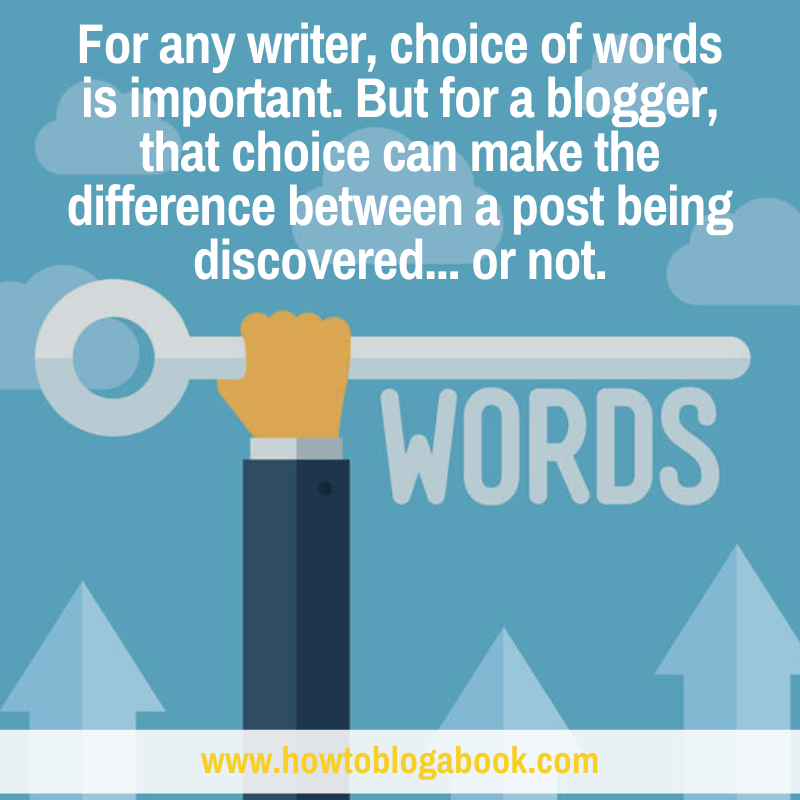All writers concern themselves with word choice, but a blogger’s choice of words can mean the difference between a post being discovered by readers or being invisible to the target audience. Today, Beth Bauer (@JourneyofBethB), freelance writer, travel blogger, yoga instructor, and entrepreneur, offers advice on keywords and keyword phrases so you can increase the chance of your posts reaching readers.
Have you ever written what you thought was an excellent blog post, posted it, and then … crickets? What happened? Why didn’t anyone read it? Maybe they couldn’t find it because you failed to include relevant keywords and keyword phrases.
It’s not enough to write an engaging post. It has to be discoverable online. If people can’t find it, no one will read it, except for your mom and best friend. Correct use of keywords and keyword phrases can change that, though.
So let’s discuss the why, when, and how of using keywords and keyword phrases in your blog posts so you can increase the likelihood they will get read.
Why Use Key Words?
Keywords are how search engines, like Google and Bing, know what your blog is about and whom they should send to your website. Whenever someone goes to Google and types in something like “Veterinarians in Portland” or “What to do in Bali,” those are keywords. To be more specific, they are keyword phrases (because they include more than one word). Keywords and keyword phrases can be short or long, but most commonly, they include three to five words.
You likely won’t be the only one using a specific keyword or keyword phrase in your posts. But if you use them more than the other bloggers, Google will likely send traffic your way and not theirs. And if you don’t use them, someone else will. Then your blog will fall way down in the rankings never to be seen on the first Google Search Engine results page.
What Keywords to Use
Some keywords only generate a few clicks, while some keywords get thousands of clicks per day. Both keywords or keyword phrases might cover the same topic, but the more common the term or phrase, the more often it will show up in internet searches.
The only way to know what keywords to use is by knowing your niche and what they would be searching for and by doing keyword research. It’s always a good idea to do your keyword research before you write your posts. If you’re looking for a great keyword tool, try SEMrush. A basic account is free.
Once you enter a keyword phrase, you’ll see a list come up with details about suggested keywords. The first column shows volume, meaning how many times that keyword is searched. Choose a few keyword phrases that you like that you can incorporate into your posts easily, and make sure you scatter then throughout your content.
Ubersuggests is another excellent keyword tool. I like it because you can start using it right away without signing up for an account or doing anything else. Once your list is generated, click on keyword ideas on the left-hand side, and it creates more ideas for you. A word of caution, though, it’s easy to get distracted and find yourself spending hours analyzing results and getting lost in your research. Stay focused. Get in, figure it out, and then get back to what you do best—writing your blog.
When to Use Keywords
When should you use keywords? By now, you probably know that you should use them in every post and often. The more times they show up in your content, the better. This strategy helps with your ranking in search engines versus your competitors’ rankings.
But don’t get carried away! Using too many keywords or keyword phrases—a practice called “keyword stuffing”—could actually hurt your ranking. Overuse is unprofessional and should be avoided.
Write about your topic. And use keywords and keyword phrases in an organic way. That works best.
How to Use Key Words?
Once you figure out the most searched words and phrases in your particular niche, include them in your blog posts. Don’t use them arbitrarily, though. That’s is known as “keyword spamming,” and it will not only hurt your ranking but annoy your readers. The search engines will recognize your keyword spamming and could flag your site. Your readers might stop reading your blog because it no longer seems authentic. So, use common sense.
Keywords are as essential to your blog and posts as the story you’re telling on the site. They are one of the fundamentals of writing and growing a successful blog. If you don’t understand what they are, how to find them, and when to use them, commit to learning more. There are plenty of great books, online courses, videos, or in person-classes on the subject of keyword and phrases.
Even if you’re an old pro, it never hurts to take a refresher course. As you know, technology is always changing, and you want your skills to stay current.
What has been your experience with using keywords and keyword phrases in your blog posts? Tell me in a comment below.
About the Author
 Beth Bauer is a freelance writer, travel blogger, yoga instructor, and entrepreneur currently working on her third novel. She has traveled to over 20 countries in just the last two years and enjoys life as a digital nomad. She is originally from the Pacific Northwest of the U.S.A., and when she’s home lives on the Long Beach Peninsula with her dog, Ozzie.
Beth Bauer is a freelance writer, travel blogger, yoga instructor, and entrepreneur currently working on her third novel. She has traveled to over 20 countries in just the last two years and enjoys life as a digital nomad. She is originally from the Pacific Northwest of the U.S.A., and when she’s home lives on the Long Beach Peninsula with her dog, Ozzie.
Photo courtesy of bloomua


And so is the proof-read; see …’choice of words is important’, misspelt as “Imporant” in the graphic. Sorry. 🙂